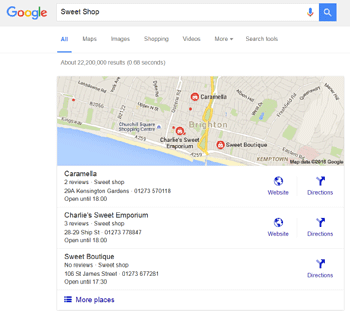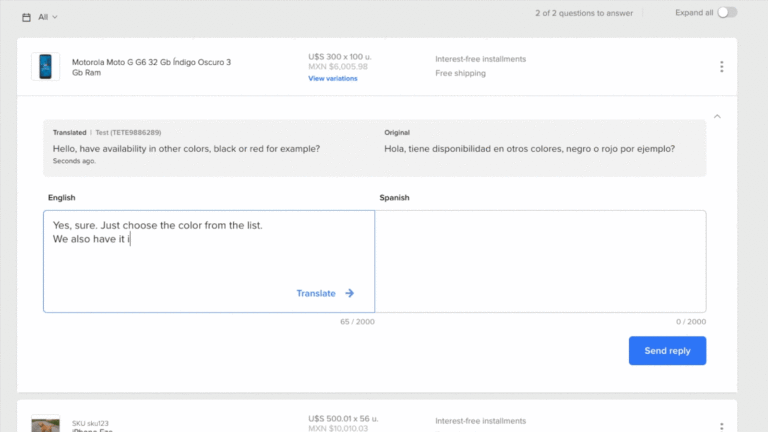Walmart has grown into a globally recognized brand and dramatically changed the retail landscape since opening its first store in 1962. In fact, because 90% of Americans live within 10 miles of a Walmart store, it has become the go-to retailer for in-store shopping.
Walmart launched its online marketplace in 2009 to create a trusted and transparent platform to ensure customer and brand loyalty. Its presence in ecommerce has made it the world’s largest omnichannel retailer and provided merchants the opportunity to sell their products on their marketplace in front of 120 million unique monthly visitors.
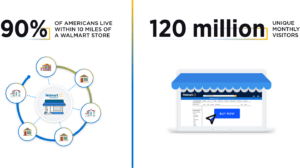

With more and more shoppers turning to digital channels to make purchases, it’s imperative to have the right mix of sales channels to expand your customer reach and increase brand recognition and revenue.
In order to grow, merchants need to revisit their omnichannel strategies and explore more digital marketplace opportunities beyond their ecommerce stores.
Forecasters expect multichannel sales to make up close to 46% of all ecommerce sales by 2023, up from 40.3% in 2019. Retailers selling through a single branded ecommerce site like BigCommerce saw a 58% revenue growth after adding a marketplace. Selling on a secondary marketplace can increase revenue by 106%.
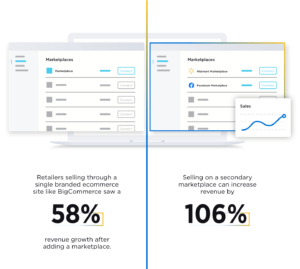

“Omnichannel shopping is quickly becoming the baseline expectation for customers. Suppliers, sellers and retailers alike must embrace that if we’re going to succeed together.”
— Michael Mosser, GM of Entertainment, Toys and Seasonal, Walmart
Walmart Marketplace is a strategic channel merchants should consider in their omnichannel strategy. Third-party sellers get significantly more exposure on Walmart.com compared to Amazon.
As the world’s largest physical retailer, Walmart’s incredible infrastructure and the ability to provide shoppers the freedom to buy online and pickup/return in store (BOPIS and BORIS).
In this guide we’ll dive in on:
- Why Walmart Marketplace is right for your business.
- How to get started with Walmart Marketplace.
- Best practices and success strategies to drive sales.
What is Walmart Marketplace?
As a large-scale cross-category digital retail platform, Walmart Marketplace is the second largest marketplace after Amazon and offers over 35 product categories with products appearing directly in Walmart.com search results.
In order to ensure a positive experience for both vendors and shoppers, Walmart is selective of its sellers and has an extensive vetting process. This means that customers get better quality products and merchants have less competition. In fact, merchants see 13x more sales on Walmart Marketplace than Amazon.
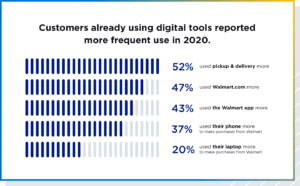

Walmart Marketplace Audience
The average shopper on Walmart Marketplace is between the ages of 23 and 38, is married with children and owns a home. Like so many other consumers, Walmart shoppers are increasingly buying more online across a variety of channels.
Findings included the top five purchase categories: groceries, personal care, health, household cleaning products and beauty products. Customers also tried new digital tools (pickup & delivery, Walmart.com) to shop versus going in-store to make purchases.
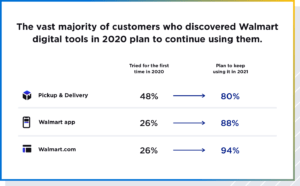

Why Sell on Walmart Marketplace?
Walmart’s brand recognition allows merchants to reach new audiences and provides businesses with an impressive amount of exposure. Walmart Marketplace sellers receive roughly 27,000 monthly visitors compared to 2,100 on Amazon.
As a Marketplace seller, you’ll have control over your business, including inventory, retail pricing, fulfillment and customer care. Merchants who sell on Walmart Marketplace gain access to many benefits, including:
- Incremental revenue stream and ability to reach millions of shoppers.
- Options for fast shipping, easy returns and pickup, plus top-notch customer service with Walmart Fulfillment Services (WFS).
- Self-serve advertising portal to target the right shoppers.
- Competitive pricing structure and transparent referral fees.
- Centralized management of Walmart and other sales channels.
Merchant Success Stories
VitaBox, an essential goods company, connected its entire product catalog of 8,500+ products to Walmart in as little as two days. Since becoming operational on Walmart Marketplace, Vitabox increased sales an additional 25%, with Walmart quickly becoming the company’s second-largest sales channel.
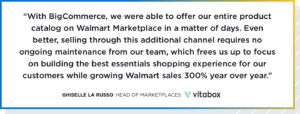

Stone Coat Countertops, a DIY remodeling supply company, wanted to increase their audience reach and get their brand in front of new customers, specifically Walmart in-store shoppers. They knew the application to sell on Walmart Marketplace can be a long process and looked to BigCommerce for help.
“We had been trying to get our products on Walmart since last Q4, but BigCommerce was able to escalate our application and get us on Walmart very quickly. We also know Walmart is making this big e-commerce play… [and] we’ve seen that some of those online brands whose products are most successful on Walmart Marketplace are also getting their products in stores, which exponentially increases sales volume.”
— Jeffrey Jensen, Site Leader, Stone Coat Countertops
How to Get Started
BigCommerce consultants are here to help with every step of the way with the application process and any questions regarding the integration. Merchants who apply to list on Walmart through BigCommerce are placed in a priority review queue.
The application process takes half the time to process compared to non-BigCommerce merchants (7 days instead of 14).
Here are the steps:
1. Create a channel in BigCommerce’s Channel Manager — Go to Channel Manager and click + Create Channel
2. Connect to Walmart — Under Marketplaces, click Connect to Walmart
3. Apply to sell with Walmart — On the next page, click Apply to sell to begin the application process.
4. Submit application with Walmart — After clicking Apply to sell, the seller will be redirected to Walmart Marketplace.
5. Choose a preferred integrator to connect BigCommerce to Walmart:
- CedCommerce (SB): Easily connect and automate your products and order management directly with Walmart from within BigCommerce. A great fit for small businesses who are also looking to integrate with various channels based in countries around the world.
- Codisto (SB/MM): Seamlessly create, manage and optimize your Walmart Marketplace listings, inventory and orders directly from within BigCommerce. Codisto will also enable you to sync your products with other global channels, including Amazon, eBay and Google.
- Feedonomics (MM/ENT): Intelligently optimize your product feeds on Walmart Marketplace to enhance your brand’s performance. BigCommerce will be the inventory/order hub for transactions completed on Walmart.
- Sellbrite (SB): Easily sync your product catalog with Walmart Marketplace and other global marketplace channels, like Amazon and eBay. This solution will serve as your hub for inventory and orders, and will also integrate with various 3PL options like Deliverr.
- SureDone (SB/MM): Sync, sell and ship your products on key online marketplaces like Walmart. This solution will serve as your hub for inventory and orders, and will enable you to export and repurpose your data across all of the channels and fulfillment services you integrate with.
- Zentail (MM): Centrally automate listings, inventory and orders from your marketplaces and BigCommerce store. This solution will act as the hub for your inventory and orders, making it a good fit for merchants with more complex operational workflows.
“Omnichannel doesn’t mean you apply the same practice in every channel, right? It’s a matter of being in all the channels. I think you need to leverage the data and tools that you have in each of those channels to be successful. As you look at Walmart Marketplace and your business going forward, it would be looking at things specifically like what inventory is currently selling on the platform and what are the prices that it’s selling at, again, making sure that you’re being competitively priced.”
— Michael Mosser, GM of Entertainment, Toys and Seasonal, Walmart
Walmart Toolkit
Walmart Marketplace has a variety of in-depth tools and omnichannel programs to attract more customers and drive sales. Sellers have access to view and manage their data, programs to increase product visibility, buy box wins and conversion rates.
Here are our top Walmart tools to help you succeed in selling more on Walmart Marketplace:
Walmart TwoDay
Today’s shoppers expect free and fast shipping. Luckily, Walmart Marketplace offers free delivery in two days on eligible listings. This is a great free program to use to show customers you can provide free delivery in two days.
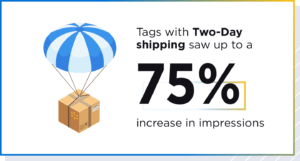

The delivery program is available to all Walmart Marketplace sellers with two ways to opt-in, primarily based on how directly you manage fulfillment and what’s best for your business:
- Seller-Managed: You manage your fulfillment network, shipping items from your warehouse(s) and possibly additional fulfillment partners for some items. Performance criteria must be met to be eligible for this option.
- Third-Party-Managed: You can use a BigCommerce and Walmart’s joint partner such as Deliverr or Shipbob, to fulfill all orders on your behalf.
Pro Seller Badge
A Pro Seller badge optimizes your listings and lets customers know you consistently provide great shopping experiences with on-time delivery and free returns. No application is needed to get the Pro Seller Badge, and Walmart will automatically add the badge to a merchant’s catalog.
Walmart has the following criteria to be eligible for the Pro Seller Badge:
- Listing Quality Score : 70% of a seller’s trending catalog must be above 60%.
- Delivery defect rate: <10%.
- Cancellations: < 2%.
- Orders: More than 100 in the last 90 day.
Walmart Fulfillment Services (WFS)
WFS offers merchants fast, low-cost fulfillment services to reach customers. Sellers are able to store inventory at Walmart fulfillment centers and access Walmart’s Free & Easy Returns program.
When a customer places an order, WFS picks, packs and ships the item to the customer on a seller’s behalf and handles customer support including returns. There are product requirements that apply:
- Products must ship to Walmart fulfillment centers within the United States.
- No perishable or regulated products.
- Maximum product weight is 30 lbs.
- Maximum product dimensions: 25” x 20” x 14”.
If interested to apply for WFS, fill out the application here.
Sponsored Products
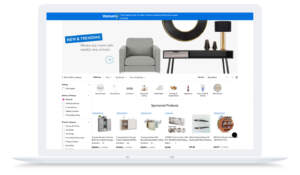

Utilizing Walmart Sponsored Products increases your visibility by allowing you to reach and engage shoppers at every stage of their journey. Your ads appear on the first page of search results, category pages and item pages to drive traffic to your products.
Sponsored Products help consumers find and purchase products that you sell on Walmart. They’re cost-per-click ads, so you only pay when a shopper clicks on your ad.
Sponsored Products are selected based on a combination of relevance and bid:
- Products advertised must win the buy box.
- Products advertised must be in stock.
Partner Help
Once a merchant is live on Walmart, our partners such as Tinuiti and Teikametrics can amplify your listings and manage sponsored ads on Walmart.
- Tinuit’s comprehensive program helps your brand scale up on Walmart through effective advertising management, creating content and media designed for conversions, and refining your operations program.
- Teikametrics provides robust reporting options and additional data, giving a more holistic view of advertising and business performance.
Listing Quality Dashboard
The Listing Quality Dashboard is a free tool to optimize your listings to stand out. The dashboard provides a measurable quality score and a detailed breakdown of contributing factors to improve your listings.
The Listing Quality Score is calculated by what drove a customer to purchase similar items using an algorithm. Recommendations are also provided, including best practices on competitive pricing, detailed descriptions and your customer service rate.
Best Practices
Shoppers expect a consistent and easy experience regardless of whether an item is sold by Walmart or by a Marketplace seller. There are many ways to be successful on Walmart Marketplace and here are our top tips:
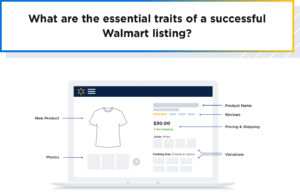

How to Optimize Your Listings
1. Make your product name count. The first thing people will see is your product name, so consider including words that are product-specific and unique. We recommended keeping your product name between 50-75 characters long.
Pro Tip: Use a descriptive title such as adding a color if it’s something your customer will most likely search for.
2. Keep your catalog up to date. This is extremely important to provide the best shopping experience for potential customers. Accurate pricing, correct images with robust descriptions of your product are a must. Don’t forget to include length, materials, size and any additional information relative to your product.
3. Choose clear and various images. All listings must have at least two images. They must also be in focus, professionally lit and photographed. Don’t show accessories that do not come with the item.
4. Pick the right categorization. Walmart lets you pick categories and subcategories for your listings, but finding the proper category isn’t always obvious. Refer to Walmart’s Categorization Guide for additional information.
Pro Tip: Avoid selecting “other” as the category unless necessary, as it may reduce the level of customer traffic to your product.
5. Provide the right UPC. Walmart requires you to provide a Universal Product Code (UPC) for every listing. For more guidance, click here.
FAQs
Does it cost anything to sell on Walmart Marketplace?
There are no setup, subscription or monthly fees. Walmart deducts a referral fee once a sale occurs on Walmart Marketplace.
What types of items can I sell on Walmart Marketplace?
Walmart allows an extensive range of products on their site. Sellers are required to follow Walmart’s policies, which include some limitations, so please review Walmart’s Prohibited Products Policy for more information.
What is Walmart Fulfillment Services?
Walmart Fulfillment Services (WFS) is a program that allows sellers to store their inventory at Walmart fulfillment centers. When a customer places an order on Walmart.com, WFS picks, packs and ships the item(s) to the customer on a seller’s behalf. WFS also handles all customer support and returns for these orders.
Products fulfilled by Walmart qualify for TwoDay delivery and Free & Easy Returns programs.
What are Walmart’s shipping requirements?
Walmart has five shipping methods available. You can select the carriers, shipping price and shipping method to set up your seller profile in Seller Center. Orders must be shipped in non-branded packaging and can’t include materials from any company other than Walmart.
What are Walmart’s returns and customer service policies?
Returns for Walmart Marketplace purchases are designed to offer customers a consistent experience across Walmart.com. You can view the full return policy on Seller Help. Your customer service information (including customer service email address, hours of operation and customer service phone number) will display with your item listings on Walmart.com.
What will my items look like online?
They will look like other items sold on Walmart.com but include your company information, such as shipping, return policy and contact information.



